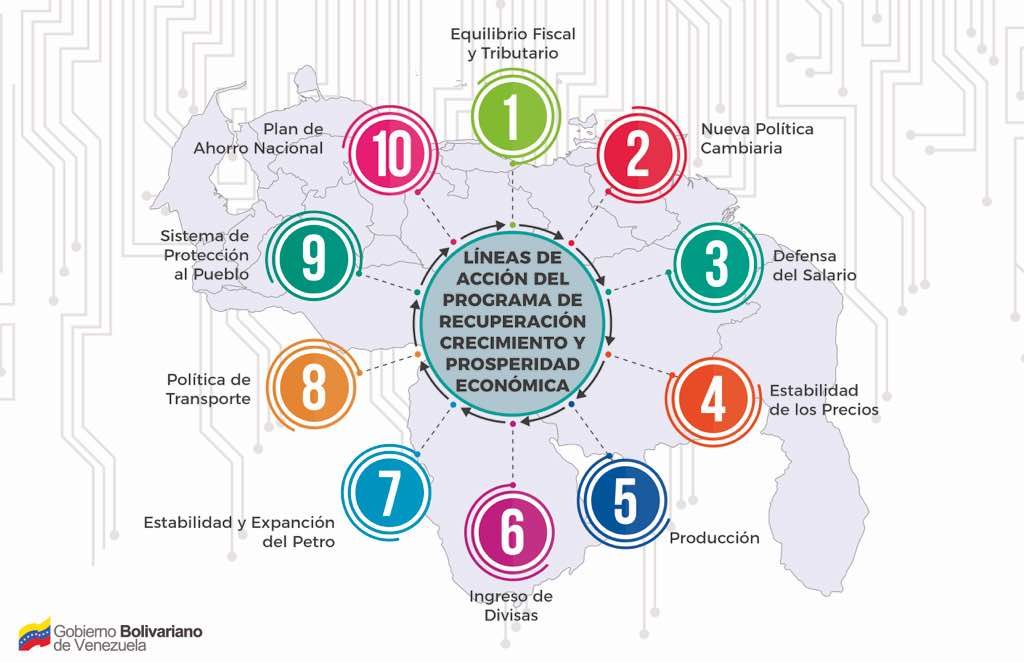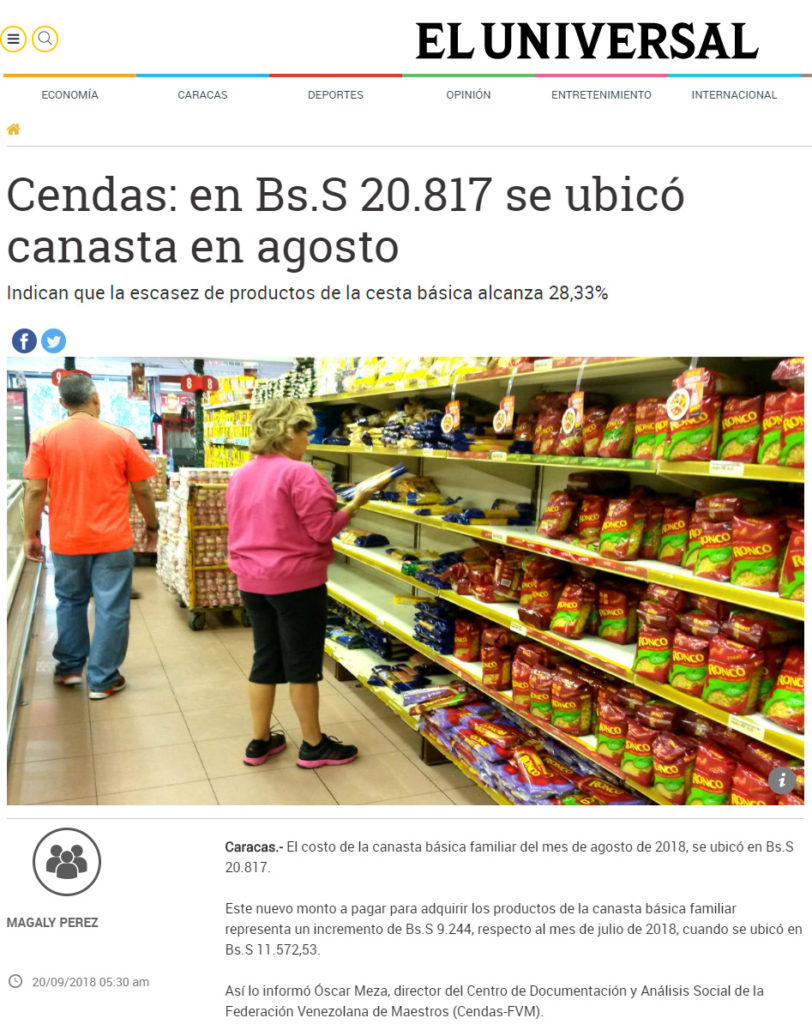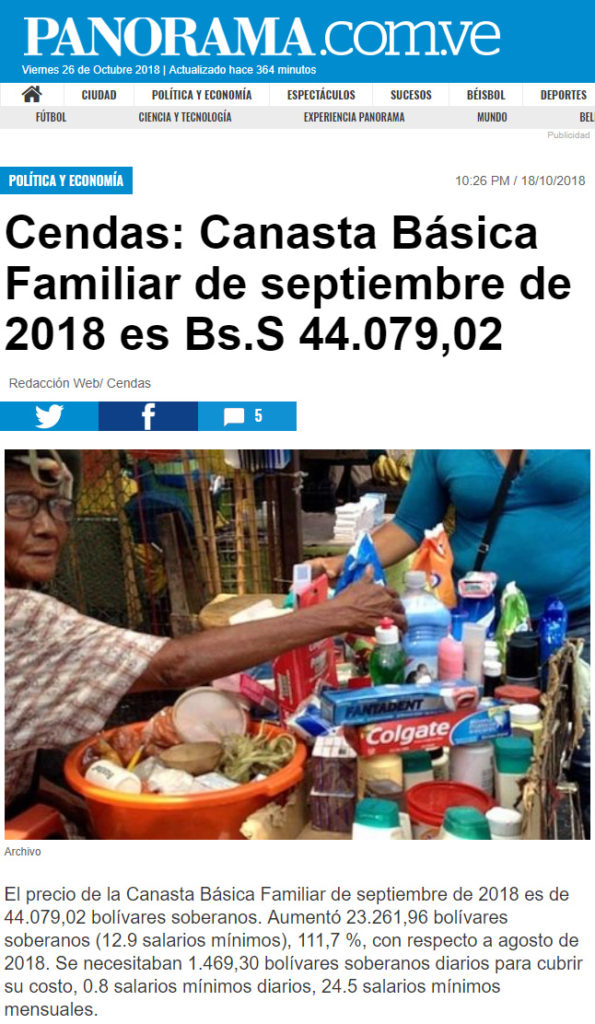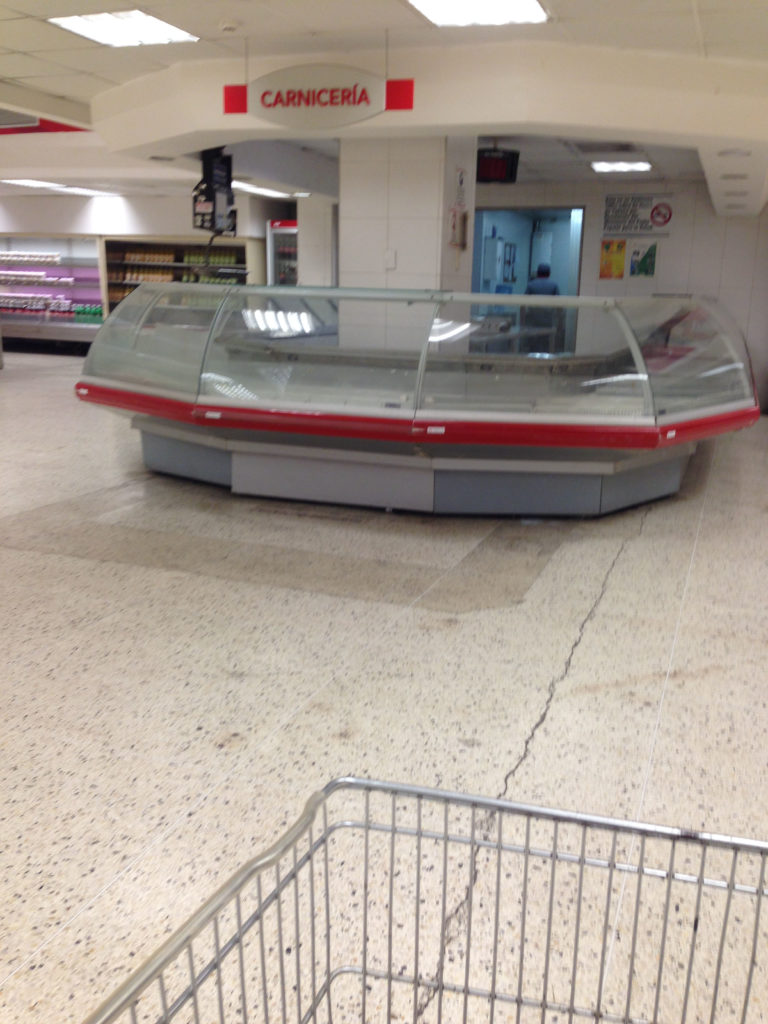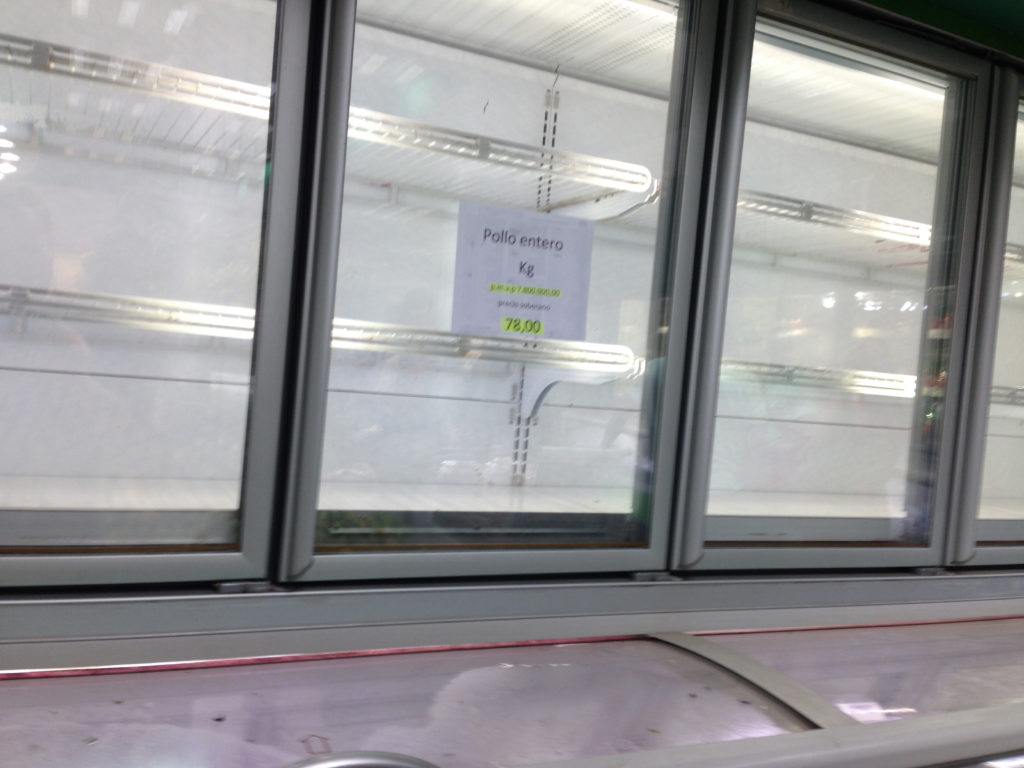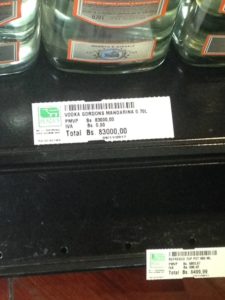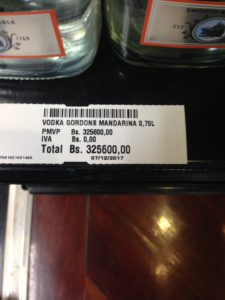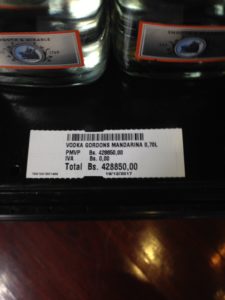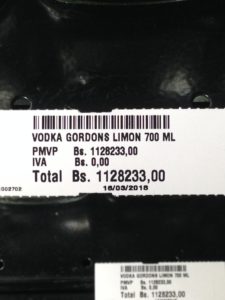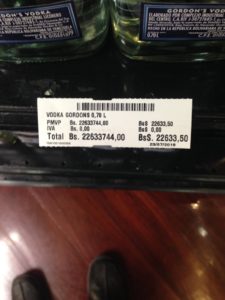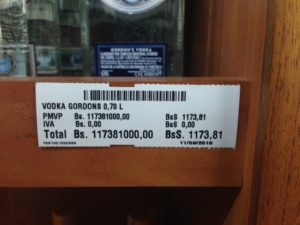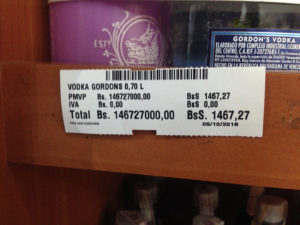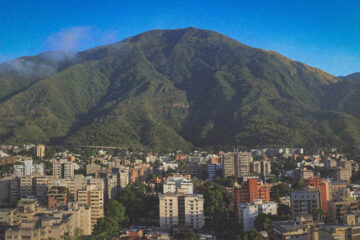Venezuela might as well be a synonym of inflation and/or disaster. Inflation has been a long-standing problem that predates my birth. However, officially speaking, this October marked our first official year of hyperinflation—and boy let me tell you, it certainly is not an anniversary worth celebrating.
Hyperinflation has certainly taken its toll on all of us. It’s been a never-ending endurance race in which new obstacles are added on every new lap. Time, our own health, and even our sanity—it’s all been thrown off the table. There’s no easy way out of this racetrack—if there is one at all. You just gotta keep running, dodge every obstacle, go through every possible shortcut, and perhaps, just perhaps, you might see a way out of this mess.
For the past two months the government has continuously announced new economic measures almost every week. Each one seems to aim towards being more outrageous than the previous. Money keeps being printed, zeroes have been axed off the scale, and forcing their yet unlaunched crypto to even those that desire to flee this disaster are but some examples.
Everything they’ve done and announced during these past two months is part of the framework of the alleged panacea to all of our woes: The shining “Economic Recovery, Growth and Prosperity Program”.
And yet, despite all the fanfare, all the media coverage, and all the mandatory broadcasts there doesn’t seem to be any positive results in sight. Every day we wake up poorer, and hyperinflation keeps cutting deeper and deeper.
How bad is it? Well, let’s grab some numbers.
As of September 2018, the monthly minimum wage is 1,800.00 Sovereign Bolívares (or 180,000,000 Bolívares Fuertes).
According to CENDAS, a Venezuelan social analysis organization, the market basket (known as Canasta Básica Alimentaria) needed to sustain a family through August 2018 had an estimated cost of 20,817.00 Sovereign Bolívares. A whooping 2,081,700,000.00 Bolívares Fuertes.
For September 2018, CENDAS estimated the same market basket at 44,079.02 Sovereign Bolívares, more than twice the amount required during August 2018. There was no change in minimum wage throughout September.
With the sheer majority of the country’s wage tables now equalized around the monthly minimum wage—1,800 Sovereign Bolívares (which itself is an amount that’s anchored to the infamous and yet to launch Petro cryptocurrency), you needed 24.5 minimum wages just to sustain a regular family through September. And this is excluding any additional and unforeseen expenses derived from school, health, leisure, and others.
If we convert those 44,079.02 to US Dollars using the government’s “official” rate as of the time of this writing (63.87 per USD on Monday Oct. 30), then you needed approximately $690.13 in order to cover the average minimum expenses of a regular family.
With everyone under an equalized wage table that makes them earn $28.18 per month (or $8-10 per month if you go by a more realistic average of the handful black market rates that now exist) then you see how living a normal life in Venezuela impossible. You no longer live here—you just survive.
This is exactly what the government has always wanted. They may have broken your two legs but you goddamn better be grateful and obedient because they’ve loaned you a pair of jury-rigged crutches.
At the rate things have increased in price during October 2018—well, you might as well need more than a whole month’s salary per day. I saw so many things simply double in price these past two weeks. A kilogram of ham now costs more than 1,800 Sovereign Bolívares, a loaf of bread went from 64 to 96, eggs are approximately 700 for a pack of 30, and the list goes on.
The new currency family that began circulating in August 20th is already insufficient for most day to day transactions. The largest banknote: Bs.S 500 (equivalent to 50,000,000 in the old scale) is already not enough to buy a regular meal in the streets. Hell, it’s days—maybe just hours away from not being enough to buy a large bottle of Coke or Pepsi.
That 1,000,000% inflation that the IMF and others have projected? It might soon be a reality at this rate. I can buy a can of tuna today, put it on a shelf, and after a month it’ll have tripled in value.
Meat and chicken continue to be absent from most shelves since no one in their right mind wants to openly sell them at a loss. You can sometimes find pork in my nearest supermarket, but with a kilogram of it going for ~1,500 Sovereign Bolívares it is way out of reach for most.
I said it a year ago: This is an unwinnable scenario that you can’t possibly hope to overcome on your own. This is the Venezuelan Kobayashi Maru. I’d like to avail myself of this opportunity to thank everyone once more, patrons and non-patrons alike; because it is thanks to you guys that I’ve been surviving and providing sustain to my brother while I simultaneously navigate through different bureaucratic labyrinths in hopes of escaping as soon as possible.
Not even foreign currencies are escaping hyperinflation now. Those with foreign currency aid are finding that they required slightly increasing amounts of foreign cash in order to keep up with hyperinflation’s rhythm through these past weeks.
Black market has started to ramp up once more which will hopefully alleviate this situation, even if it’s ultimately a double-edged sword for the economy. But as long as the government continues to control the free exchange of currency then this wheel will keep spinning—and boy, it’s starting to kick back into high gear.
The discrepancy between the price of government controlled products and services is wider than ever. My latest power bill? 6.16 Sovereign Bolívares. A large candle? 650-800 Sovereign Bolívares. Lighting a candle to pray is an unaffordable luxury in this socialist nation. A bottle of Coca Cola (480 Sovereign Bolívares) costs more than all of my 2018 power, telephone, and internet bills combined.
The Vodka Hyperinflation Index™
For the past year or so I’ve had this little silly hobby. It involves going to my nearest supermarket and taking pictures of same bottle of Gordon’s Vodka every now and then just to keep track of its price changes. It’s not even a good brand of vodka, and it’s a local one—so no import taxes or anything.
Do you want to see hyperinflation in action? Then look no further, behold!
That same bottle of vodka was going for 1,150 in December 2015 and 5,550 in July 2016. Sadly, I never took pictures of it during that time.
Dr. Hyperinflation or: How I learned to stop worrying and love the wild ride
This tragic story (with an overabundance of borderline depressing dark humor) has had it all. One whole year of official hyperinflation that’s preceded by several years of high inflation percentages. Eight long and drawn out years plagued with all sorts of shortages, food lines, power blackouts, water, and a whole other array of woes and tribulations.
Everything amounts to one conclusion: Suck it up and adapt if you want to survive. Situations once irregular and outlandish have become part of our daily lives.
I suppose that I could condense some of my “adventures” into a short list of tips. Now, these aren’t in any way empirical and I won’t try to pass them off as such. It’d be too pretentious of me to do so even though the Zulian/Italian in me makes me genetically predisposed towards pretentiousness.
For starters, you must completely erase the phrase “It can’t get any worse” from your dictionary. Because it can, and it will. Things barely work as it is, things will break when you least expect them. In fact, when things seem to be working with relatively normalcy—that’s when you should worry.
All the constant jumps in prices? Stop worrying about them, expect them.
“It’s so expensive now!” — A lady next to you at the supermarket.
“Vergacion!” — Kaleb after seeing the new price of a bottle of Coca Cola.
“Shit! These were 120 last Friday.” — Some guy.
These are examples of at least 60% of the ambient chatter in any Venezuelan supermarket or store at any given time.
It’s the new Venezuelan hyperinflation gag reflex. When prices can change in a matter of hours then you’ll get appropriate reactions out of the bewildered customers. But after a year of hyperinflation you shouldn’t even be surprised at this point if something simply doubled in price overnight.
If you spent 750 Sovereign Bolívares (Bs.75,000,000.00) last week in four items then next week you should bring 1,500 Sovereign Bolívares. Maybe you’ll only need to spend 1,000, but better be safe than sorry.
If you can afford it then stock on it. The fact that supply and restock chains are as unstable as it gets means that you need to become some sort of hoarder and get used to having emergency stocks of X or Y items.
Let’s say that you go through four bar soaps each month. Now, let’s say that circumstances aligned and you happen to have money to buy eight right now. You’re standing right in front of them.
What should you do? Make the sacrifice and buy all eight, now—even if it puts a dent in your already battered finances. The next time you are running low on bar soap they might not be any to purchase—or they might have tripled in price.
I used to hoard Festal (simple OTC Digestion aid pills) for my mother, not because she’d go through them rapidly, but because I wasn’t sure when it would be the next time that I was able to find them—if at all. Their availability is still hit or miss.
When you’re running low on something then you know it’s time to start hunting for it.
Have your Dealer(s) on speed dial. No, I’m not talking about drugs. Every time you regulate something to the point of holding it at gunpoint then you give rise to a gray market of that item. These systematic shortages that have been going for more than eight years have given created a new competitive profession in Venezuela: Bachaqueros.
Truly a wonder that can only be achieved through Socialism. Bachaqueros are people who resell smuggled or contraband items (especially hard to find regulated items) and make good bank while doing so. It is their solution to the Venezuelan Kobayashi Maru, who am I to judge.
These men and women come in all shapes and sizes. Their repertoire varies based on how well they’ve setup their contraband network. From food, toiletries, car batteries, spare parts—there’s a bachaquero for everything these days. Hell, there’s some that specialize in medical supplies such as gauze or blood tubes.
They may be expensive but hey, they sure offer a solution. After all, everyone has to rig the game their own way if they want to survive, especially with the low equalized wages we now have in the country.
Get creative and always have a plan B through Z. Necessity is the mother of all inventions, right? And we’ve become quite good at it. This is Socialist Venezuela after all, where nothing can possib-lie go wrong.
Would you laugh if I told you that due to a small problem the plastic drain hose on my AC was cut short? I put a bucket at the end to collect the water. I haven’t permanently fixed this problem because this slowly filling bucket is an extra toilet flush that I can use during the days that I don’t have water. Every little drop is precious my friends.
Can’t find/afford meat? Either you make some bean patties or get used to sardines.
When everything is collapsing around you then you gotta come up with solutions using what you have at your disposal. I fixed my internet using an utility knife, medical tape, and a rubber band. MacGyver ain’t got nothing on me.
Stuck in a line? Achieve Nirvana. You will be stuck in lines for hours and hours. If you’re going to spend a considerable amount of your life free time in a supermarket or bread line then why stress? Just chill. I know it’s easier said than done but that’s how things go here.
Lines are often caused by things that are beyond your control. From a lack of staff to network problems with the debit card reader (even with the new currency in place debit or credit card transactions are still king). There’s nothing you can do about it.
There is a random chance that you might be stuck next to one or several like-minded individuals. If so then awesome; that section of the line becomes an impromptu group therapy session. Your patience needs to be harder than diamonds, you can’t let stress devour you. And I say this as I pay the price of not listening to my own advice. Last week I collapsed due to stress and insomnia, thankfully I’m much better now.
Adapt your schedule to your environment’s shortcomings. Sucks yeah, but you gotta do what you gotta do. It’s been more than two years since I last had running water 24/7. I’ve long since adapted my schedule around the hours that I do have water.
Learn to trade. If I learned something out of years of playing MMOs is that you should never underestimate the power of trading goods for other goods.
Every now and then I get access to a very low quality powdered milk. I do not suffer from lactose intolerance but there’s something about this milk that my stomach does not like. I may not want this milk, but someone else does.
So what do I do with it? Some of them I give away to people that I know have children. Others I trade for items that I may need such as oil, rice, or flour. Over the past year I’ve traded meds, foods, and so many other things in exchange for other goods. That’s what happens when you mix a dead currency with widespread shortages.
The thyroid meds I’m taking right now? I traded cardevilol for them. This is the first time in over a year and a half that I’m taking non-expired levothyroxine. I need to start looking for more of it soon or it’s back to expired pills for me.
Get rid of your Bolívares ASAP. You got a sweet extra cash from a side gig you’ve been doing? Sweet my dude! Now get rid of those Bolívares, like, now!
There’s no point in hoarding large amounts of a currency that loses value with each passing hour.
Buy foreign currency or crypto with it, get something for your house, treat your significant other during the weekend, do something besides keeping it in your bank. Because next week those Bolivares will be worth half of what they are right now.
Only keep what you need of course. Keep in mind that while it might be a dead currency, it is the only legal tender for day to day transactions. So it’s wise to have a small contingency pool for any unforeseen circumstances (especially during the weekend). But for the love of God do not let those Bolívares sit in your bank account for too long.
Let go. It’s unfortunate, but there comes a time when things you enjoyed partaking in are now inaccessible due to money constrains or diminished availability. All you can do is hope to partake in them once you manage to escape from this utopia.
This first official year of hyperinflation has been overwhelmingly brutal for everyone within these borders. The hunger and despair are more palpable with each passing day. The overall malnourishment of Venezuelans is more than evident now; but of course, you’ll see that those in the politburo are the ones gaining weight.
I don’t wanna end this with a pessimist tone but I’m afraid that this is just the beginning…
-Kal
Thanks to A Sentient JDAM for helping me with my broken grammar <3
